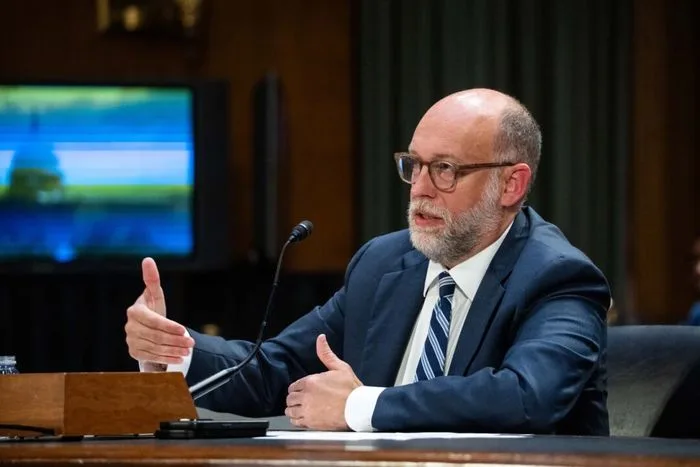By Melanie Sun
The White House budget office has sent a memo directing federal agencies to consider preparing “Reduction in Force” (RIF) notices for a portion of their employees in the event of a government shutdown, as the Sept. 30 funding deadline nears without a clear path forward for congressional funding.
The GOP’s continuing resolution (CR), bill H.R. 5371, which the House passed 217-212 last week with support from one Democrat, Rep. Jared Golden (D-Maine), seeks to extend current federal funding levels through to Nov. 21.
Republican lawmakers said the bill would allow more time for negotiations on the required full-year spending bills. Senate Democrats have opposed the bill. It requires enough support from Democrats to overcome the 60-vote supermajority threshold to avoid a filibuster.
If Congress does not approve funding for the new financial year by Oct. 1, the federal government will be forced into a shutdown.
“Unfortunately, congressional Democrats are signaling that they intend to break this bipartisan trend and shut down the government in the coming days over a series of insane demands, including $1 trillion in new spending,” the memo, provided by the White House budget office, states. The memo was first reported by Politico.
To prepare the government for an “orderly shutdown” in the event of a lapse in approved funds, the White House’s Office of Management and Budget (OMB) said it was directing agencies to consider Reduction in Force (RIF) notices for the portion of their employees supported by discretionary funds, which lapse on Oct. 1, in a manner “consistent with applicable law.”
“Programs that did not benefit from an infusion of mandatory appropriations will bear the brunt of a shutdown,” the memo said.
Social Security, Medicare, veterans’ benefits, military operations, law enforcement, and air traffic control are funded by mandatory appropriations and will not be affected in the case of a shutdown.
The portion of agency employees engaged in programs, projects, or activities that are not consistent with President Donald Trump’s priorities could see a lack of funding in the event of a shutdown if other sources of funding, such as H.R. 1 (Public Law 119-21) are not available, the letter said.
“If Congress successfully passes a clean CR prior to September 30,” this will not be necessary, it states.
“Once fiscal year 2026 appropriations are enacted, agencies should revise their RIFs as needed to retain the minimal number of employees necessary to carry out statutory functions,” it adds.
The RIF notices would also be “in addition to any furlough notices provided due to the lapse in appropriation.”
The OMB asked the agencies to submit drafts of their RIF plans for review.
In the memo, the OMB noted that CRs are how Congress has funded the federal government for the past 10 fiscal years and avoided furloughs of federal employees.
“We remain hopeful that Democrats in Congress will not trigger a shutdown and the steps outlined above will not be necessary. The President supports enactment of a clean CR to ensure no discretionary spending lapse after September 30, 2025, and OMB hopes the Democrats will agree,” the president’s budget office said.
The OMB also said that it held its first planning call for the potential shutdown earlier this week, as required by OMB policy, and that updates to contingency plans to direct agencies on how to handle a government shutdown would be provided as the end of the fiscal year approaches.
The White House’s “agency contingency plans” webpage is currently blank. It remains unclear what federal services could be impacted in the event of a shutdown next week.
Negotiations
Negotiations between Democrats and Republicans on Capitol Hill to keep the federal government funded have stalled.
Senate Democrats have maintained that they will not support the government’s temporary stopgap bill unless the Trump administration agrees to reverse nearly $1 trillion in Medicaid cuts in the recently passed One Big Beautiful Bill Act and extensions in subsidies for low- and middle-income Americans who purchased health insurance through the Affordable Care Act.
Republicans, who were elected to Congress in November 2024 with a slim majority in both chambers, say the cuts solely targeted waste, fraud, and abuse, including health care for illegal immigrants. Democrats say more than 10 million Americans will lose coverage under the new laws, per Congressional Budget Office estimates, with potential impacts on small rural hospitals.
President Donald Trump on Tuesday canceled a meeting with Senate Minority Leader Chuck Schumer (D-N.Y.) and House Minority Leader Hakeem Jeffries (D-N.Y.), saying that their demands were “unserious and ridiculous.”
“To the Leaders of the Democrat Party, the ball is in your court,” Trump said in a subsequent post. “I look forward to meeting with you when you become realistic about the things that our Country stands for. DO THE RIGHT THING!”
“What’s ‘unserious’ is ignoring the 93 percent spike for health insurance coming to Americans on November 1. Democrats are fighting to lower prices, while Republicans are failing families,” Schumer said in a post on X.
Sen. Tim Scott (R-S.C.) said in a post on X, “Democrats are sending a clear message: they’d rather make Americans foot the bill for illegal immigrants’ health care than ensure our troops get paid, our veterans receive the care they earned, and vital services keep running for American families.”
Responding to news of the OMB memo, Jeffries told OMB director Russell Vought to “get lost.”
“We will not be intimidated by your threat to engage in mass firings,” he said.
Schumer said in a statement provided to media outlets that the “unnecessary firings will either be overturned in court or the administration will end up hiring the workers back.”
The Epoch Times has contacted the OMB for comment.
Federal Downsizing
The suggestion to prepare for a reduced federal workforce aligns with the Trump administration’s stated plan to downsize the federal government, in line with a presidential order directing a “critical transformation of the Federal bureaucracy” to maximize efficiency and productivity.
After Trump took office in January, his administration on Jan. 28 had offered to buyout to nearly all 2.3 million federal employees with eight months’ pay through September and benefits in exchange for their voluntary resignations. As of September, about 154,000 or 6.7 percent of the federal government’s 2.3 million workforce had taken up the offer, with at least 100,000 others having been laid off.
Many of these reforms have been held up by court injunctions amid challenges to their legality. Trump had warned of furloughs for federal employees who didn’t accept the buyout offer.
During Trump’s first term, Republicans, who were in the minority, shut down the government in October 2018 for a record-long 35 days. The impasse ended in January 2019, when Trump agreed to a temporary funding measure that withheld billions of dollars sought by the administration for its border wall.
Joseph Lord and Emel Akan contributed to this report.





